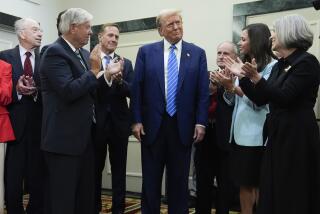Congress returns to a gun control fight and a government shutdown deadline

- Share via
WASHINGTON — Congress returns to Washington this week amid mounting pressure from Democrats and the public to enact new gun restrictions, but lawmakers from both parties say meaningful action hangs solely on President Trump.
Since lawmakers were last in session Aug. 2, three mass shootings have killed 38 people and injured many more.
The White House is expected to release gun policy proposals that Trump supports, possibly this week. But few gun safety advocates or Democrats are optimistic that the proposals will be as expansive as they want.
Returning lawmakers will also face a quick deadline to fund the government again, or risk another shutdown.
And the White House needs to pick up the pace on negotiations with Congress over a revised NAFTA trade agreement if Trump’s top legislative priority, now called the United States-Mexico-Canada trade agreement, is to become law this year. All the while, some House Democrats will be clamoring to get impeachment proceedings against Trump underway.
The White House gun proposal comes at the urging of Senate Majority Leader Mitch McConnell (R-Ky.), who is trying to balance growing public support for increased background checks with a slate of Republican senators who are skeptical of angering the powerful gun lobby.
McConnell said no legislation will get a vote on the Senate floor without approval from Trump, whose popularity in Republican-leaning states would give political cover to Republican senators to vote in favor.
Even the most ardent gun control supporters acknowledge only Trump can move the needle in Congress.
“The administration recognizes this is a moment where people are looking for leadership and looking for action,” said Sen. Chris Coons (D-Del.), who said he has raised the issue with Ivanka Trump, the president’s daughter and a White House advisor. Coons is advocating for legislation that would require federal officials to notify states when someone fails a background check when trying to buy a firearm, a potential warning sign of a mass shooting.
“If after all this and what he has said, if President Trump fails to take a clear position and lead, I think there will be very widespread disappointment and anger,” he said.
Sen. Roy Blunt (R-Mo.), a member of the GOP leadership, said Trump needs to “set some guidelines” for what he would support. “The president needs to step up here,” Blunt said Sunday on NBC’s “Meet the Press.”
But he warned against doing nothing at all. “We take this silly, ‘If we don’t get everything, we don’t do anything’ [approach] and fail to do the things we could do,” he said.
Trump has spoken with several lawmakers sponsoring gun policy bills, including a 30-minute meeting with Democratic Sen. Joe Manchin III of West Virginia on Thursday evening at the White House.
A few Republicans and Democrats, including Coons and Manchin, have held conversations over the August recess on a potential compromise. So far, those negotiations have not yielded any agreement.
Trump has been unclear on where he stands. After back-to-back mass shootings last month in Texas and Ohio, the president said he was open to enhanced background checks, but then later seemed to back track and echo the position of the powerful National Rifle Assn.
One possible outcome is that the White House releases a proposal that Democrats view as inadequate, a move that could force Democrats to choose between supporting weak reforms or rejecting it for the status quo.
While the gun debate could linger, Congress faces a more pressing deadline to approve spending bills to avoid another government shutdown on Oct. 1.
Neither party wants another shutdown. House Democrats are eyeing a stopgap measure to fund the government through Nov. 22, just before lawmakers leave town for Thanksgiving.
House Democrats have enacted 10 of the 12 required spending bills, but the Senate has done none. While Senate Republicans plan to work on those bills this week, there’s little time to sort out the differences between the House and Senate bills. McConnell indicated Monday that Republicans would support a stop-gap spending plan, but did not explicitly endorse the House plan. He said the Senate would “prevent any funding lapse.”
The House is scheduled to be in Washington for only 10 more weeks this year, meaning that any legislation Democrats hope to pass — such as prescription drug policy or a new trade agreement — must be acted upon soon.
Negotiations between the Trump administration and Congress on the new USMCA trade agreement are expected to pick up. House Democrats have several outstanding concerns about the language on prescription drugs, climate change and enforcing labor standards in Mexico.
In the House, Speaker Nancy Pelosi (D-San Francisco) will contend with brewing support among her rank-and-file caucus members for impeaching the president.
More than half of the 235 Democrats support starting an impeachment inquiry, a symbolic milestone hit over the August recess. House Judiciary Chairman Jerrold Nadler (D-N.Y.) said recently that the House is already in effect conducting “formal impeachment proceedings.”
Pelosi has long resisted starting a formal inquiry without broad public support for impeachment and overwhelming evidence of wrongdoing. But other Democrats have grown frustrated that the House has not moved forward.
“There is a very solid majority of the caucus now on the right side of history,” said said Rep. Jared Huffman (D-San Rafael), a prominent advocate of an impeachment inquiry. “The pressure to really do more and to do it faster is only going to grow.”
The House Judiciary Committee is expected to hold a key vote soon that would further define their investigation. Democrats also are expanding other probes. On Friday, two House committees demanded documents related to the use of Trump properties by the president and his administration at taxpayer expense, calling it a potential violation of the Constitution.
“The committee does not believe that U.S. taxpayer funds should be used to personally enrich President Trump, his family and his companies,” said House Oversight Committee Chairman Elijah E. Cummings (D-Md.).
While in Ireland recently, Vice President Mike Pence opted to overnight in a Trump-owned resort that was 180 miles from his meetings in Dublin. Pence’s chief of staff told reporters that the president had suggested the hotel, but the vice president’s office later issued a statement saying “at no time did the president direct our office to stay at his Doonbeg resort.”
More to Read
Get the L.A. Times Politics newsletter
Deeply reported insights into legislation, politics and policy from Sacramento, Washington and beyond. In your inbox three times per week.
You may occasionally receive promotional content from the Los Angeles Times.











